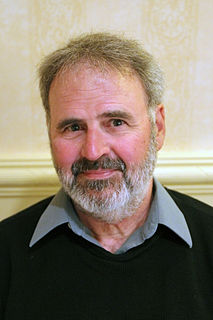A Quote by Robert Todd Carroll
Science is simply a logical process of discovering truths about the world we live in; the illusion is that science is some sort of a set of strange rules, a religion that speaks algebra or a magical group of incantations and spells.
Related Quotes
Science has only two things to contribute to religion: an analysis of the evolutionary, cultural, and psychological basis for believing things that aren't true, and a scientific disproof of some of faith's claims (e.g., Adam and Eve, the Great Flood). Religion has nothing to contribute to science, and science is best off staying as far away from faith as possible. The "constructive dialogue" between science and faith is, in reality, a destructive monologue, with science making all the good points, tearing down religion in the process.
Organized religion is sane and not silly when read as myth and poetry rather than science and law. Religion speaks nonsense when taken literally, but reveals some of the deepest truths of humankind when understood mythically, poetically, and even allegorically-that is when it is read with an active and creative imagination.
Poetry is a sort of inspired mathematics, which gives us equations, not for abstract figures, triangles, squares, and the like, but for the human emotions. If one has a mind which inclines to magic rather than science, one will prefer to speak of these equations as spells or incantations; it sounds more arcane, mysterious, recondite.
The whole point of science is that most of it is uncertain. That's why science is exciting--because we don't know. Science is all about things we don't understand. The public, of course, imagines science is just a set of facts. But it's not. Science is a process of exploring, which is always partial. We explore, and we find out things that we understand. We find out things we thought we understood were wrong. That's how it makes progress.
Science is like society and trade, in resting at bottom upon a basis of faith. There are some things here, too, that we can not prove, otherwise there would be nothing we can prove. Science is busy with the hither-end of things, not the thither-end. It is a mistake to contrast religion and science in this respect, and to think of religion as taking everything for granted, and science as doing only clean work, and having all the loose ends gathered up and tucked in. We never reach the roots of things in science more than in religion.
My interests drew me in different directions. On the one hand I was powerfully attracted by science, with its truths based on facts; on the other hand I was fascinated by everything to do with comparative religion. [...] In science I missed the factor of meaning; and in religion, that of empiricism.
I love science fiction but I don't like fantastic [cinema]. For example, if you have a magical ring and you can explode the world with it. What are we talking about? You know, it's not interesting. I don't like Lord of the Rings. Even Star Wars, for me, I don't understand this kind of story. But Alien, because the rules of the game are very precise, it could happen. I love science fiction. I have an idea about robots in the future.
Despite all the advancements in science, and all things about religion that are disproved it still marches on. The bottom line is that the only real, absolutely provable answers about life and our place in the universe are provided by science, and religion has been holding down science since day one.
Because a fact seems strange to you, you conclude that it is not one. ... All science, however, commences by being strange. Science is successive. It goes from one wonder to another. It mounts by a ladder. The science of to-day would seem extravagant to the science of a former time. Ptolemy would believe Newton mad.
A great swindle of our time is the assumption that science has made religion obsolete. All science has damaged is the story of Adam and Eve and the story of Jonah and the Whale. Everything else holds up pretty well, particularly lessons about fairness and gentleness. People who find those lessons irrelevant in the twentieth century are simply using science as an excuse for greed and harshness. Science has nothing to do with it, friends.




































